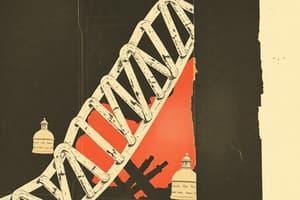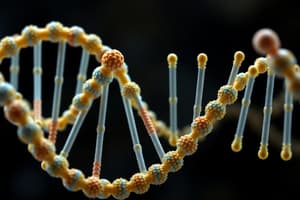Podcast
Questions and Answers
What technique did Rosalind Franklin and Maurice Wilkins use to analyze the structure of DNA?
What technique did Rosalind Franklin and Maurice Wilkins use to analyze the structure of DNA?
- Chromatography
- X-ray crystallography (correct)
- Centrifugation
- Electrophoresis
According to Chargaff's rules, what is the relationship between the number of T's and A's in a DNA molecule?
According to Chargaff's rules, what is the relationship between the number of T's and A's in a DNA molecule?
- A's are more than T's
- They are always equal (correct)
- There is no relationship between T's and A's
- T's are more than A's
What distance in the X-ray scattering pattern suggested the width of the DNA helix?
What distance in the X-ray scattering pattern suggested the width of the DNA helix?
- 3.4 nm
- 0.34 nm
- 4.0 nm
- 2.0 nm (correct)
For DNA molecules to have a regular and repeating structure, what conclusion did researchers draw from the X-ray scattering patterns?
For DNA molecules to have a regular and repeating structure, what conclusion did researchers draw from the X-ray scattering patterns?
Which pair of scientists, along with Wilkins, were awarded the Nobel Prize in Physiology or Medicine in 1962 for their work on the structure of DNA?
Which pair of scientists, along with Wilkins, were awarded the Nobel Prize in Physiology or Medicine in 1962 for their work on the structure of DNA?
What did Watson and Crick propose as the arrangement of two strands of DNA in their model?
What did Watson and Crick propose as the arrangement of two strands of DNA in their model?
What is one of the fundamental characteristics shared by organisms as mentioned in the text?
What is one of the fundamental characteristics shared by organisms as mentioned in the text?
Who coined the term 'cells' for the structures observed in cork tissue?
Who coined the term 'cells' for the structures observed in cork tissue?
Which scientist famously stated that the 'dream of a bacterium is to become two bacteria'?
Which scientist famously stated that the 'dream of a bacterium is to become two bacteria'?
What role does genetic information play in organisms?
What role does genetic information play in organisms?
Which process do organisms engage in to maintain stable internal conditions?
Which process do organisms engage in to maintain stable internal conditions?
What is one way organisms acquire energy as mentioned in the text?
What is one way organisms acquire energy as mentioned in the text?
What did Sidney Altman and Thomas Cech receive the 1989 Nobel Prize in Chemistry for?
What did Sidney Altman and Thomas Cech receive the 1989 Nobel Prize in Chemistry for?
What is a characteristic of ribozymes?
What is a characteristic of ribozymes?
What does the discovery of ribozymes suggest about the relationship between RNA and proteins?
What does the discovery of ribozymes suggest about the relationship between RNA and proteins?
What is the significance of the RNA world hypothesis?
What is the significance of the RNA world hypothesis?
Which of the following processes were enzymes and possibly ribozymes involved in according to the text?
Which of the following processes were enzymes and possibly ribozymes involved in according to the text?
What selective advantages led to the evolution of new functions according to the text?
What selective advantages led to the evolution of new functions according to the text?
Flashcards are hidden until you start studying
Study Notes
DNA Structure
- Watson and Crick knew that DNA has a sugar-phosphate backbone
- Erwin Chargaff established two empirical rules: (1) equal number of purines and pyrimidines, and (2) equal number of T's and A's, and C's and G's
- Rosalind Franklin and Maurice Wilkins used X-ray crystallography to calculate distances between groups of atoms in DNA, revealing repeating distances of 0.34 nm, 2.0 nm, and 3.4 nm
- The scattering patterns suggested a helical structure with a 2.0 nm-wide width and 0.34 nm distance between bases stacked in a spiral
- Watson and Crick arranged two strands of DNA with sugar-phosphate backbones on the outside and bases on the inside, forming purine-pyrimidine pairs
Characteristics of Life
- An organism is a living entity made up of one or more cells
- Five fundamental characteristics of life:
- Cells: membrane-bound units that regulate passage of materials
- Replication: goal of reproducing oneself
- Evolution: products of evolution, continuing to evolve today
- Information: processing hereditary information encoded in genes
- Energy: acquiring and using energy to stay alive and reproduce
Cells and Evolution
- Robert Hooke coined the term "cells" in 1665, observing small compartments in cork tissue
- Two hypotheses on the origin of cells:
- unknown
- unknown
RNA Structure and Function
- RNA molecules have different shapes and chemical properties based on base sequences
- RNA can function as a catalytic molecule (ribozyme or RNA enzyme)
- Sidney Altman and Thomas Cech discovered catalytic RNAs, winning the 1989 Nobel Prize in chemistry
- Ribozymes catalyze reactions similar to protein enzymes
- Tetrahymena ribozyme catalyzes hydrolysis and condensation of phosphodiester linkages in RNA
Studying That Suits You
Use AI to generate personalized quizzes and flashcards to suit your learning preferences.




